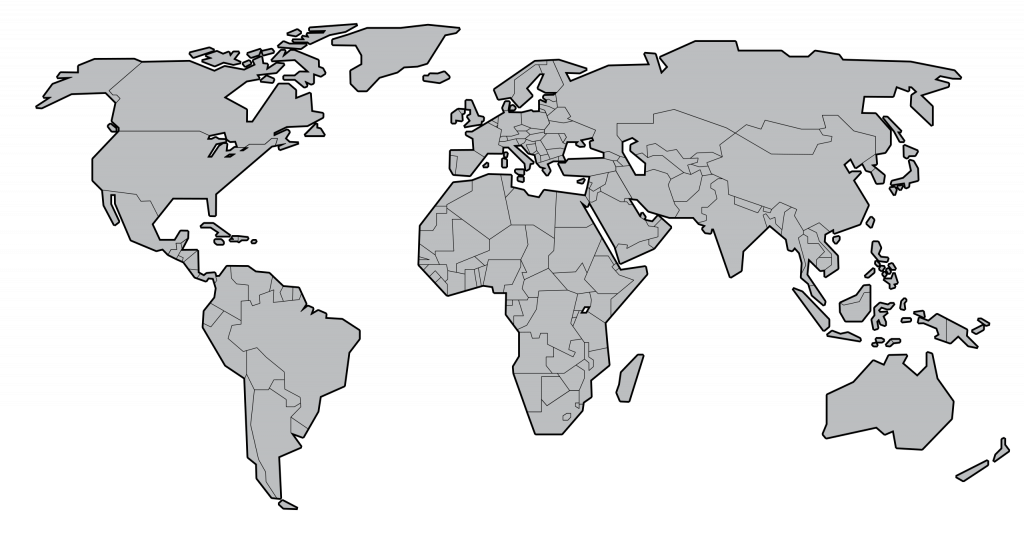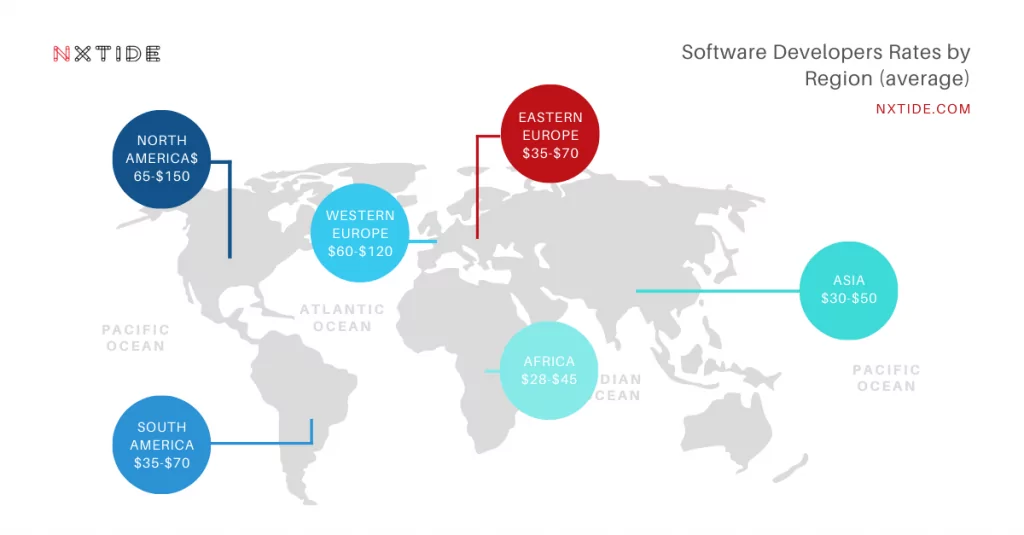How to Hire Remote Software Developers – the Ultimate Guide.

How to Hire Remote Software Developers - the Ultimate Guide.
The global shortage of software developers is a well-documented and ongoing problem. In recent years, the demand for software developers has exploded, while the supply has remained relatively static. This has led to a situation where there are simply not enough software developers to meet the demand. There is a global talent shortage in nearly every industry; however, when it comes to software development, the need for qualified individuals is much higher.
In recent years, technological advancements have caused an increase in jobs within this field, and record numbers of companies are now struggling to find employees who meet the qualifications. The need for more expertise in programming languages, automation, and cutting-edge technologies such as AI and neural networks, machine learning, big data, AR/VR/MR, DevOps. , and IoT is growing.
The latest reports about the tech skills gap are shocking. According to the US Bureau of Labor Statistics, there will be a shortage of 2 million software engineers by 2028. The talent gap is even higher in Europe where the number of unfilled jobs in the tech sector is expected to reach 2.8 million by 2030.
With such a high demand for software developers, it’s no wonder that companies are increasingly turning to remote work to hire the best talent. In fact, 43% of tech companies say they hire remotely, and that number is only going to increase in the coming years.
The Global Software Talent Market.
At first glance, the idea of working with someone who is on the opposite side of the globe seems intimidating. Many employers are intimidated by the inability to walk up to such an employee and look over their shoulder to find out what they are doing, but many understand that the potential reward justifies the risks.
The absence of geographic restrictions means that you can hire absolutely any staff – for example, developers from Poland, technical support staff from Canada, and suppliers from Delhi. With access to first-class professionals from around the world, you will have extraordinary freedom of choice.
Moreover, if your employees are distributed around the globe, you will be able to manage costs more effectively. In particular, remote software engineers can work under a contract without pension and insurance contributions, with minimal overhead costs.
Perhaps you yourself know about all the benefits of hiring remote employees, but you still doubt whether they will work effectively.
If this is the case, don’t worry – your fears are quite justified. Fortunately, you can always control the process and influence the success of recruitment.
Why It Can Be Tough to Hire Software Developers in 2022?
Technology plays a role in nearly all aspects of most businesses, yet there is still a lack of people who are knowledgeable and able to provide adequate service. The primary reasons for this global undersupply tech workers are the globalization of the economy and technological advancements. Just within the US, we have seen an increase in our need for technology contributors to help with economic growth; however, not enough people have arose to meet this challenge. Even during the COVID-19 pandemic of 2020, most sectors experienced stagnation in their outputs and productivity, but the demand for developers, engineers, and other tech professionals remained high. With an exploding number of individuals in search of skilled IT personnel, there is a high demand for them. Not just major industries like technology, media, and finance firms, but also smaller enterprises wanting to integrate and optimize their growth and create new goods and services are driving this demand. It should go without saying that health care and education have seen an increase in their need for trained specialists. These specialists are no longer limited to coders who work all day long. There is a growing demand for software engineers, cloud computing experts, cybersecurity professionals, data scientists, and other areas of tech that have managed to permeate growing and established sectors alike.
Who is a remote software developer?
Remote employees, unlike office ones, interact with the team virtually, although they are also a part of it. They may be from other countries and may not even be personally acquainted with employers. This type of interaction is often associated with freelancing; however, not only a freelancer but also any full-time employee can work remotely.
If a freelancer is a specialist who just performs the agreed amount of work within the project, then the vendor-offered developer is a full-fledged team member, and only the geographic location distinguishes them from the in-house employees.
We will talk more about the differences between these types of specialists later, but now let’s clarify the main thing. In the post-pandemic world, this line is blurred, and remote developers seem to be a new trend in the real digital economy.
Why It Can Be Tough to Hire Software Developers in 2022?
Despite the impressive advantages of remote collaboration, everything is not so simple. Looking for a remote developer and managing them can be tricky and challenging for startups and small and medium-sized enterprises for various reasons. However, all of them can be successfully overcome. And the main thing here is to understand what troubles you can face in your search.
Let’s consider the most widespread obstacles that can appear when building a strong remote development team.

Difficulties in identifying truly high-quality candidates
The Internet provides many opportunities that are easy to get lost in. You get access to millions of developers around the world, but choosing the right one is not an easy task. Once you post a job ad, you will start getting a lot of responses. And you will need to consider every potential candidate to hire the perfect one.
When you have thousands of CVs, sorting, reviewing, and ranking the top is really a challenge. So, the issue of verification of responses, recognition of quality, and assessment of candidates should not be underestimated.
The laboriousness of the job posting management process
To find and hire a remote team of developers, you must not only create and post job advertisements but also organize the handling job ads process. And managing posting on several resources at the same time is quite resource-intensive and time-consuming. You will need to spend a lot of energy reviewing multiple job sites, and social media and revising the huge number of applications and resumes received. In addition, writing a job posting and selecting sites for publication is also not as easy as it may seem.
For best results, you must take no rush and give due consideration to the creating and managing job ads process.
The complexity of the communication and language barriers
Language issues are still relevant in 2022. Language barriers significantly limit the choice, as the talent of remote developers doesn’t really matter if they can’t communicate with the rest of your team. So, you may find it difficult to come to a mutual understanding if the remote specialists you are considering do not speak English.
And although today there are tools for communication in foreign languages, for effective remote cooperation within one project, knowledge of all members of the same language is a must. Remember that smooth communication within the team is critical.
Market oversaturation: high demand and high rates
One more obvious problem in finding qualified and experienced remote programmers for hire is the high competition in the market. The web development industry continues to gain momentum, so good specialists are always in demand. This leads to companies competing for worthy candidates and high rates of skilled remote software developers.
In order to cope with all of the above problems, you must clearly understand what you and your team need, as well as create a reliable process of finding and screening potential candidates. This will help you filter out unsuitable specialists and find the one that will perfectly match all your wishes and requirements.
Why are Entrepreneurs Shifting Their Interest Towards Remote Software Development Team?
Remote product development (incl remote development team) can offer entrepreneurs exceptional advantages and help them gain a competitive edge in the market. Remote product development is the present and persistent reality and we all have to accept it. Hiring remote software developers for your SaaS development besides comfort has fueled the onset of outsourcing.
If you still have doubts, here are some reasons why most companies are opting for remote product development and so should you.
The constant development
The remote teams tend to work round the clock and belong to different time zones. Also, remote development tends to come with much lesser distractions because of the unwanted breaks and active work culture. Remote development facilitates constant product development with expert talents.

The Flexible working hours
To achieve the greatest level of productivity and quality, remote developers follow a specific work schedule. This means you can focus on core business issues. So this turns out to be a win-win situation for both organizations and remote developers.
The greater engagement
To get the most out of their time and produce high-quality work, remote developers must adhere to a strict daily timetable. This implies you can devote your attention to more fundamental company problems. As a result, both businesses and remote workers benefit from this arrangement.
The expanded development abilities
There is a greater possibility of you hiring remote developers from India at a very affordable price when going remote. The development capabilities are much higher in remote teams as compared to in-house professionals. They get more time to adapt and update all the changes required to survive in this competitive industry.
The expanded market reach
Through remote collaboration with developers in different geographical regions of the world, you can expand the market reach indirectly. As your partnered remote software developers are engaged closely with your startup, they act as a brand ambassador who promotes your products to potential customers.
The expanded market reach
Things are all different when you plan to hire remote developers for remote product development with skilled and brilliant minds across the globe. This can be considered the topmost benefit of hiring remote developers. The experience has made CTOs realize how they’re struggling to hire remote developers. Using a cheat sheet can simplify your remote hiring experiences.
The improved productivity rate
Those who worked in a remote development environment tend to be happier and more productive compared to those who worked in the traditional office setup.
Why You Should Hire Remote Developers or Full Remote Development Team?

The decision to hire a remote developer / remote team should be based on many factors, not just the cost. While it isn’t the right choice for all situations, there are distinct benefits for employers and their employees. As a bonus, hiring a remote developer has advantages for the global environment, which all of us should be working to protect.
The Benefits For Employers
Unsurprisingly, the benefits of hiring a remote developer for the employer rank high in the decision-making process. These include:
Reduction of expenses — Remote employees don’t need office space, and they pay for their own utilities and office supplies. If even a small portion of your workforce operates remotely, the savings can be substantial.
Access to talent — There are many specialties in the world of information technology. Finding someone who has experience in the niche you need and lives close to your base of operations may be nearly impossible. Hiring remotely allows you to tap into the global talent pool and find exactly what you’re looking for.
Adaptability — In today’s fast-paced and ever-changing global marketplace, the only way for a company to stay competitive is for it to be able to adapt quickly. Hiring remote developers may allow you to find an individual or a team that’s ready to tackle your project in a short period of time with the most up-to-date technology and techniques.
Happier employees — It isn’t a secret that happier employees are more productive and driven to help their company succeed. Both you and your remote employees reap the rewards if they’re happy because they wish to work remotely.

The Benefits For Employees (Remote Software Engineers)
The choice to work remotely is a personal one, and not every employee thrives under these conditions. However, those who choose to work remotely find many advantages to getting a paycheck without having to physically go to work. For example, they enjoy the following benefits:
A better work-life balance — While a forty-hour workweek is a standard in the United States, the time spent on work-related activities can add up to much more than that, especially when you factor in commute times. According to the Office of National Statistics in the UK, the stress of battling traffic, relying on public transportation, and the anxiety these causes have been shown to contribute to depression. Working remotely eliminates the need for a commute of any kind. It often gives the worker the freedom to set their own schedule so that they’re free to do the things that make them happy.
Efficiency — The power of employees to set their own work schedule and reduce transportation-related stress makes it easier for them to focus on the task at hand. They’re clearer-headed when they sit down to do their work, working more accurately and efficiently with less downtime.
Less resentment — Let’s face it, some folks just don’t like to be told what to do or when to do it. Giving the opportunity to work without the feeling of being micromanaged will help remote employees feel more relaxed. In turn, this makes them more likely to finish work on time.
Higher productivity — All things considered, those who choose to work remotely are happier and healthier. They’re more likely to get more done in their workday than those who work in-house.
The Benefits For the Environment
Initially, the effect of remote work on the environment wasn’t a large part of the decision-making process. Now, with the evidence that our environment is in need, our ability to protect it as best we can have become an important factor.
Huge amounts of greenhouse gasses are released into the atmosphere every rush hour. This is especially true around large population centers. Add to that the damage that is done processing all of the gas and oil that’s burned, and the toll is quite significant. Any reduction in the number of people driving or taking public transportation is a benefit to the environment.
Why NxTide Hires Remote Developers?
In addition to the above-mentioned benefits of hiring remote developers, NxTide adds another — diversity. Hiring people of different cultures and backgrounds offers your company the benefit of fresh perspectives and unique insights. What better way to increase the diversity of your workforce than by hiring remote developers from nearshore countries?
Not only does NxTide offer a talented pool of skilled IT professionals, but we also ensure that potential employees come from diverse backgrounds. This makes them an even larger asset to your company.
The Skills to look for in remote developers
Hiring remote staff is never easy. It’s even harder to hire remote developers based on just their CVs and a few Zoom interviews. However, there are some qualities that can shed light on a candidate’s ability to be part of a successful team.
1) Teamwork skills
The developer interacts daily with the team, as well as with related development departments, testers, and analysts. To successfully work on a project, they need to interact with colleagues, exchange ideas, and help each other. In addition, programmers communicate with the customer, and here you need to justify your decision and be able to adequately perceive criticism.
2) Adaptability skills
The ability to be flexible in the workflow is the most important soft skill of any specialist. The transition to a remote mode, changes in the team, and restructuring of teams are constantly changing conditions that should not affect the performance of the developer.
3) The proactivity

A competent developer thinks not only about how to solve a problem but also about how it will affect the project as a whole. Such an employee knows how to make decisions and is responsible for their choice. This skill is closely related to responsibility and purposefulness. In controversial moments, a proactive developer, first of all, analyzes their own mistakes, does not shift them to others, and is ready to redo the work. Proactivity is especially important for the team leader and manager: the thoughtfulness of their decisions affects the promotion of the business.
4) The persistance skills
Writing perfect code the first time is not always possible. The programmer must be ready to look for other stack technologies and improve the code. This manifests variability and expertise, without which it is impossible to create a quality product.
The 3 Primary Challenges of Hiring Remote Developers
Hiring the right employee is always a difficult task, and hiring a remote employee comes with its own challenges as well. Ultimately, the benefits that the right individual or team of remote developers will offer to you make the process worthwhile — both for you and your other employees.
Great advantages come with understanding the challenges you’ll face in your search. Here are three of the hurdles you’ll have to successfully navigate.
1) Creating and Managing Job Postings
Finding the best way to write a job posting is a weighty undertaking. You must ensure that it attracts the right candidates and avoids the interests of those that aren’t qualified. From there, you have to decide on the right job boards to post it on. Chances are you’ll have to post the job on multiple job boards for the best results.
All of this means that a large portion of your day may be devoted to logging in and out of job boards, and sifting through applications until you find the help you need.
2) Vetting candidates
Assuming your efforts to create a good job posting were successful, you now have a pile of potential candidates that have to be sorted through and vetted. This process will also occupy a decent amount of your valuable time.
3) Language and cultural issues
If you’re running a company based in an English-speaking country and the remote developers you’re considering are located in countries where English is not the official language, you may encounter communication issues. The talent of a developer you hire doesn’t really matter if he or she can’t accurately communicate with the rest of your team — there are going to be mistakes and delays. Be aware that some who can write fluent English may not always be able to speak it clearly, and those who speak it well may not be able to communicate effectively through writing.
Regardless of their native language, all of the above challenges can be managed with a strong understanding of what makes a talented software developer and a clear idea of what your team needs to get the job done. Extensive interviewing and time spent finding references or reviews will help to screen out some unfit candidates as well.
How To Write a Job Description for Remote Software Developers
Writing an effective job description to hire remote workers requires that you clearly and concisely explain the skills needed, the time expected, and the compensation being offered. Getting the details right will help to cut down on the number of applications you receive from people who are unable — or unwilling — to do the job within the given parameters. And it all starts with the right job title.
The software developer profession has a wide range of skills and specializations. The Dice Salary Survey found that the most popular software developer job titles in 2019 include ‘software engineer’, ‘software developer’, ‘web developer’, and ‘applications developer’. The Dice’s Salary Survey also identified some of the top hard-to-fill job titles in the US market, including:
– Full-stack developers,
– DevOps engineers,
– Front end developers,
– Senior Software Engineer
– Big data engineers, – Data scientist,
– Mobile apps developers (iOS/Android)
– System administrators
– Network engineers (all types)
– Cyber security advisors
– Automation testers.
Title Avoid fluff or superlatives when writing a job title. While you may be looking for “The Best” developer or a “rockstar” programmer, those types of words have no place in a job posting title. All you want to put in the title is a descriptive name of the actual position. For instance, if you’re looking for a developer who has experience using the Kotlin language, the phrase “Kotlin Developer” will bring in resumes from people with the exact skill you’re looking for. With a simple title like “Software Developer,” this results in receiving resumes from people who likely aren’t experienced with Kotlin.
Description The description is the place where you get to sell your job. It should contain all of the details, including required skills and your company’s expectations for those who fill the role. It should also have information about the job’s salary, benefits, and perks. Job seekers aren’t any different than the rest of us when it comes to reading large blocks of text — they frequently get bored and tune out the information. For the best results, break up the information into small chunks and include lists where applicable. If you’re at a loss for how to begin, you can find templates for job listings online. Once you have them, all you need to do is enter your specific information and the job is mostly done.
Requirements Perhaps the most important aspect of your job posting is the job’s requirements. You really don’t want prospective candidates to miss this since many job seekers consider it the make-or-break section of a job posting. This information is best formatted as a list. That way, candidates can use it as a checklist to see if they meet all of the job’s basic requirements. Again, the more specific you make the job requirements, the less likely you are to end up with a bunch of resumes that aren’t useful to you. For instance, instead of simply saying “experience required,” try instead, “at least 5 years experience using Kotlin required.”
The Remote Development Teams Hiring Process.
So, what can companies do to stop the software developer and tech talent shortage? It’s clear that a traditional hiring process is no longer an option, as candidates can literally pick and choose which company they work for. This means that companies must rethink their approach to hiring software developers and other tech talents. There’s a five-step process to hire remote software developers.
1) Find the Right Job Board and Post Your Listing
Once you’ve created a job posting that you believe contains all the relevant information in a way that’s easy to understand, you must decide where to post it.
There are many job boards online to choose from. Some cater to specific niches, and others will let you select a geographical region where your post will be available. But not every board has a good reputation or is widely known.
Take the time to research the job boards before posting, and choose the ones that best meet your needs. You may need to post on several ones to reach your desired developer.
2) Sort through the best applications
No matter how carefully you word your job posting, there’s still a chance that you’ll get applications from people who aren’t right for the job.
Avoid unqualified candidates with a quick screening of the applications. This will allow you to fully focus on those who may be an asset to your company.

3) Pay Attention to the Cover Letter and motivation
While reading through resumes will give you a clear idea of the education and experience the candidate has to offer, cover letters provide additional desired insight.
A cover letter that’s well written should be in clear English and concisely persuade you why you should hire the candidate. If it does, then you know that they’re capable of clear and effective communication. If it doesn’t, you may want to get back to searching.
4) The interview
If a job seeker has made it through the previous steps, then it’s time to set up an interview. Having a successful interview can be a bit of a challenge in the case of remote employees, but it’s still a necessary step.
Even if your interview is through a computer screen, you’ll still be able to ascertain the communication skills of the candidates. Ask the right questions to get a sense of the level of their experience and whether or not their personality will fit with the rest of your team.
5) The evaluation and testing
The final step in the process is to put the candidate through a series of tests so that you can evaluate their performance. Obviously, the exact nature of the testing depends on the role to be filled. However, giving them a task to complete in a predetermined period of time will not only give you a chance to evaluate their skills but also shows how they perform under pressure.

What Does a Good Developer Look Like? 5 Skills to Look For
It goes without saying that any remote developer you hire needs to be skilled at programming. However, that isn’t the only thing they need to be skilled at. Look for people with these five traits to make sure you’re getting a well-rounded employee with staying power.
Discipline — Any remote worker needs to be self-disciplined enough to meet deadlines and complete projects without outside intervention.
Communication — Good communication skills are necessary for most positions, but this is especially the case for remote workers.
Initiative — Remote workers must have the initiative to seek out guidance when necessary and look to continuously improve their performance.
Balance — Being able to balance one’s work life and home life is vitally important for a remote worker. If they can’t draw the line between family and work, they risk being distracted and unable to focus on the task at hand.
Maturity — Ideally, maturity encompasses all of the above-mentioned traits. A person’s age isn’t always a reliable way to determine their level of maturity.
The Skills That Make Remote Developers True Professionals
If a company hires a remote developer, this specialist is likely expected to have the critical qualities required to complete the project successfully. It’s possible to find an experienced and skilled remote programmer; the challenge is to find one that is right for your development company.
It is important to understand that there is no ideal candidate or ideal company — the recruiter’s mission is to attract and hire the most suitable specialists. This is about both professional skills and technical competencies, as well as the so-called soft qualities, which are more related to personal characteristics. Furthermore, when it comes to remote professionals, there are certain additional features directly related to teleworking that must be taken into account.
So, what are the specific soft and hard skills a recruiter should pay attention to when selecting remote developers?
1) Hard skills: expertise, professional competence, and technical abilities
It goes without saying that the remote developer must have excellent programming skills. This is the basis, but far from the only one. A technical background is definitely a must, but it doesn’t stand well on its own.
So, in terms of hard skills, traditional expert qualities, coding skills, as well as theoretical knowledge in regard to the needed technology and methodology are important. In addition to identifying technical qualities and professional experience, it is necessary to ensure that the potential employee is versatile. There are two key areas to focus on: evaluating candidates’ expertise and reviewing their technical skills.
Later we will talk about how to evaluate professional competence and assess the technical abilities of potential employees. And now, let’s make sure that while hard skills are critical, they are not the only criteria for selecting a remote developer.
Moreover, if your choice comes down to several candidates whose hard skills are almost the same, choose in favor of someone with more developed soft skills. Especially if we are talking about remote collaboration.
2) Soft skills that directly related to remote work

A solid soft competency set is equally important in the case of hiring remote specialists. This is exactly what makes or breaks a good candidate. The development process can be long and tedious; it may demand a lot of attention to detail, close collaboration within the team, and communication with customers. Not everyone is suitable for such work. No matter how good they are at programming. After all, cultivating personal competencies is no easier than learning a new coding language.
So, what should you be looking for?
Time-management.
The ability to organize the workflow, meet deadlines, manage tasks and schedule is something employers always appreciate. And when it comes to remote collaboration, time management skills become even more essential for a potential team member. In software development, getting things done on time, adhering to deadlines, and following timelines are key and non-negotiable requirements.
Problem-solving.
The ideal employee is focused on solutions, not problems. Remote developers need to be decision-makers, must understand the importance of when to troubleshoot and when not, and always be able to overcome failure and see it as a success.
Self-motivation.
This should be an in-built trait for every remote specialist. They must be able to motivate themselves at the right time, connect to the project at any stage, and offer the best possible results. The best remote developers combine the ability to be a self-starter and self-driven professionals.
Teamwork skills.
Although the remote employee does not interact directly with other team members, they work together on the same project and towards the same goal. Therefore, remote developers must be great team players — they should be open to discussion and brainstorming. Team spirit is critical to any teamwork, as it allows for making the best decisions and choosing the best ideas.
Communication skills.
Smooth communication and the absence of language barriers are prerequisites for achieving productivity in the workflows. Also, remote staff should be aware of all the necessary tools, channels, and platforms used for interaction within the team.
Continuous learning.
Continuous acquisition of new knowledge is an essential aspect for all specialists in the software development industry. This is due to the constant emergence of new technologies and progressive solutions, learning new languages, coding, and its correct implementation. With this approach, you get a future-oriented product. Look for talented developers with initiative and long-term vision.
Discipline and work-life balance.
Remote work presupposes a high level of self-organization and autonomy of employees. Such specialists must have excellent self-discipline, cope with tasks without outside interference, and remain effective without constant supervision. In addition, they must be able to clearly distinguish between work and personal life. This approach is the key to concentration and productivity.
Should You Hire a Freelancer or Full-Time Remote Developer?
The Ultimately, the decision as to whether to hire a freelancer or full-time employee depends on the specific needs of your company and budget. Decide which type of developer is right for you by reviewing the pros and cons of both options.
Pros of Freelance Remote Developers
Hiring freelance remote developers will offer these advantages:
– Save time and money
– Huge talent pool to choose from
– Adaptability
Cons of Freelance Remote Developers
These are some of the disadvantages of hiring freelance remote developers:
– They may disappear every now and then
– Harder to determine work ethic and experience
– Might be difficult to establish loyalty to you or your company
Pros of Full-Time Remote Developers
Hiring a full-time employee to work remotely is a relatively new concept, but it is gaining in popularity. Here are a few of the reasons why:
– Less expensive
– More talent to choose from
– Higher employee satisfaction and production
Cons of Full-Time Remote Developers There are some potential pitfalls when hiring remote developers. These include: – Hard to create a team mentality – Time zone issues – Potential communication issues and culture clashes
A freelance remote developer might be the right choice for your company if your budget is small or if the project is short-term. If you’re likely to have continuous work or are trying to build a foundation on which to grow your company, then a full-time remote developer may be the best choice.
The Top Places To Find and Hire Remote Developers

Once you’ve decided that hiring a remote developer is the right choice for your company, you need to begin the search. Here are 7 places where you may be able to find the right match.
Freelance Marketplaces
Freelance marketplaces are the most useful if you have a specific short-term project you need to have completed. In this case, the freelancers advertise their expertise, availability, and pay requirements. The employers search through them to find the candidates they want.
Job Boards Job boards are perhaps the best way to find a skilled developer on your own, but the process is labor-intensive. Still, if you have a position to fill and you don’t want to waste money paying an agency to do the work for you, they are the way to go. Here are several of the more useful and popular job boards.
LinkedIn This was created as a way for members of different career niches to find each other, provide career advice, and give referrals. It has grown into a great place to find remote or in-house workers of any niche.
Referrals Referrals have always been, and still are, an important way to acquire information on new employees. They help to familiarize you with the talent, work ethic, and skills of whom you may be considering.
Reddit Since Reddit is a forum site, you may not expect it to be a valuable resource when searching for new talent. Like most sites, though, it has evolved over time. It now provides areas known as subreddits where people of specific niches can showcase their skills and make a name for themselves.
Finding Remote Developers with the Support from Proffesional Vendors
The most obvious way to find your top developers would be the tactics mentioned below.
1) Cooperating with the traditional staffing companies.
This option allows building a software development team with a help of local HR, outsourcing agencies. You are still pretty much involved in the process and fully responsible for the team-building activities. Local recruitment providers usually focus on delivering candidates based on the information provided by the client. You must bear in mind that HR agencies are definitely not experts when it comes to software engineering and tech skills assessment. They are also missing knowledge regarding software processes and skills required for the team, project management. All these factors could cause some issues when creating your perfect software development team structure. The bottom line here is that this offshore software team development model may be risky unless you’ll be 100% engaged and dedicated or hire a local IT Manager who will work with agencies to deliver the final outcome.
2) Cooperating with specialized, offshore software companies.
Another offshore software development team-building method is to cooperate with professional, local offshore vendors. Unlike traditional staffing agencies, these companies offer offshore development services as their core business, so they can help you how to structurize, recruit, manage and scale your future software development team. This option offers is a very interesting one due to business factors. Local IT partner provides you with expertise and resources from the first day of cooperation. The whole setup phase is much faster and less risky for the client. The level of efficiency and quality is also much higher due to advanced specialization only in this field.
3) Setting up a company subsidiary
This is naturally the most obvious and direct way. You will have a full conrol of the whole process as you manage everything through your dedicated employess. However this option require time, resources and taking more risk.
How to build a development team or an ODC in offshore / nearshore location?
The most obvious way would be just to set up a local subsidiary and start the recruitment process with your local HR team. Unfortunately, it requires some time and time is a very valuable asset in modern business. Let’s then take a closer look at the different types of offshore software team-building methods:
1) Cooperating with the traditional staffing companies.
This option allows building a software development team with a help of local HR, outsourcing agencies. You are still pretty much involved in the process and fully responsible for the team-building activities. Local recruitment providers usually focus on delivering candidates based on the information provided by the client. You must bear in mind that HR agencies are definitely not experts when it comes to software engineering and tech skills assessment. They are also missing knowledge regarding software processes and skills required for the team, project management. All these factors could cause some issues when creating your perfect software development team structure. The bottom line here is that this offshore software team development model may be risky unless you’ll be 100% engaged and dedicated or hire a local IT Manager who will work with agencies to deliver the final outcome.
2) Cooperating with specialized, offshore software companies.
Another offshore software development team-building method is to cooperate with professional, local offshore vendors. Unlike traditional staffing agencies, these companies offer offshore development services as their core business, so they can help you how to structurize, recruit, manage and scale your future software development team. This option offers is a very interesting one due to business factors. Local IT partner provides you with expertise and resources from the first day of cooperation. The whole setup phase is much faster and less risky for the client. The level of efficiency and quality is also much higher due to advanced specialization only in this field.
3) Setting up a company subsidiary
This is naturally the most obvious and direct way. You will have a full conrol of the whole process as you manage everything through your dedicated employess. However this option require time, resources and taking more risk.
The summary
The most important advantage of hiring remote devs is the opportunity to work with a much wider, global talent pool. And for many candidates, it is the format of work that becomes the decisive factor why they choose your firm, and not some larger or well-known company.
This mode of work is not for everyone, but now more candidates are looking for ways to optimize their work-life balance in an optimal way, and for this, remote work is the ideal way. And for companies that provide such an opportunity to their employees, this can become a serious competitive advantage.
When it comes to finding and hiring remote software developers, there are a few different avenues you can take. You can hire an agency to do the work for you, post a job on a board or marketplace, or search through referrals. Whichever route you choose, make sure you take the time to vet the candidates thoroughly before making your final

Hire Remote Software Devs or Development Teams with NxTide
Over our 7-year company activity we have helped many US and EU companies to successfully build Software Development Teams and Software Development Centers in a variety of locations in Poland.
Interested? – Let’s discuss your case on a call.
Marcin Dziedzic, CEO of Pragmatic Coders and NxTide.
Other related articles that might interest you
Other related articles that might interests you:

How to Build a Nearshore Software Development Team in Poland?
Services Custom Software Development Web Applications Mobile Applications Cloud Applications Software Development Teams Nearshore Development Office Offshore Development Center Build…

How to Hire Remote Software Developers – the Ultimate Guide.
Home How to Hire Remote Software Developers - the Ultimate Guide. How to Hire Remote Software Developers - the Ultimate…

Creating an Offshore Software Development Team – a practical guide.
Home Creating an Offshore Software Development Team - a practical guide. The offshore software development model is becoming increasingly popular…


